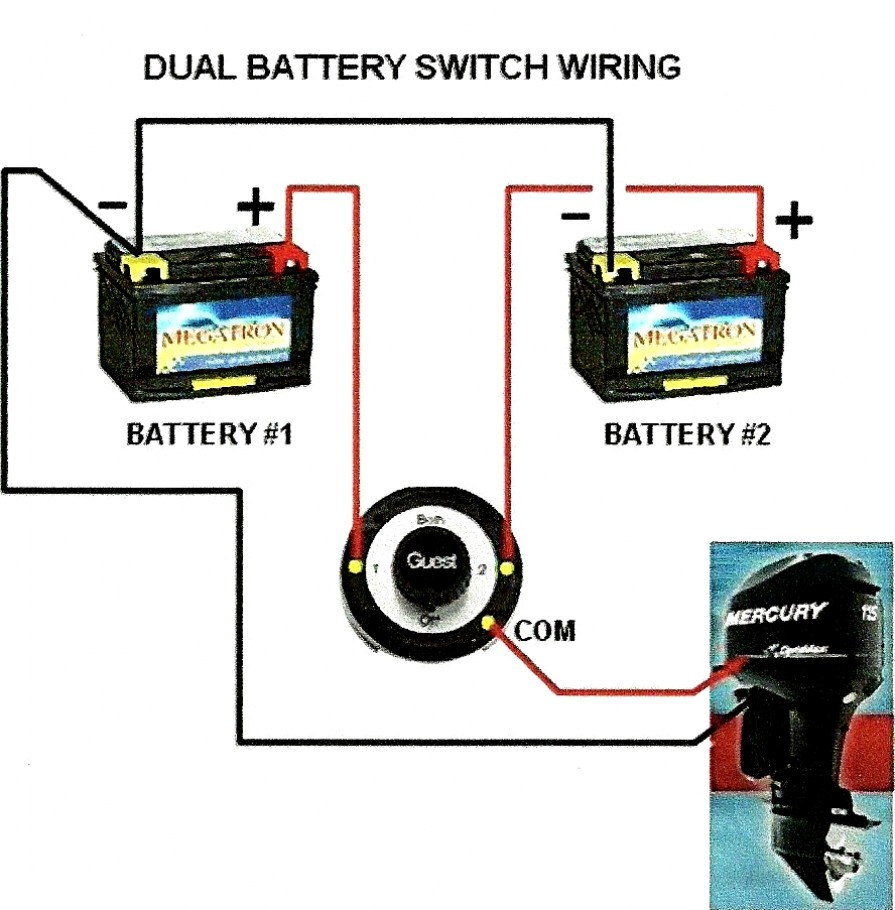Power Up Your Boat: Understanding Marine Dual Battery Systems

Imagine this: you're miles offshore, the sun is setting, painting the sky in vibrant hues. You're reeling in the catch of the day, and suddenly, your boat's engine sputters and dies. Your starting battery is drained, leaving you stranded. This nightmare scenario is precisely why a properly installed dual battery system is essential for any serious boater. Understanding the marine dual battery wiring diagram is the key to avoiding such situations and ensuring reliable power for all your onboard needs.
A marine dual battery setup involves connecting two batteries, typically using a battery isolator or a voltage-sensitive relay (VSR), to provide separate power sources for your boat's engine starting and house loads (electronics, lights, etc.). This setup ensures that your starting battery always has enough power to crank the engine, even after extended use of house electronics. It provides peace of mind and enhances safety on the water.
The concept of dual battery systems isn't exclusive to marine applications. Similar principles are used in RVs, off-grid solar systems, and even some emergency vehicles. However, the marine environment presents unique challenges, including exposure to saltwater, vibration, and temperature fluctuations. This makes understanding the specifics of a marine dual battery wiring schematic crucial for a reliable and long-lasting setup.
The core problem that a dual battery setup addresses is the potential for draining the starting battery, leaving you unable to start the engine. Traditional single-battery systems risk this issue, especially when using power-hungry electronics like fish finders, trolling motors, or stereos. A dual battery configuration isolates the starting battery from these house loads, guaranteeing a dedicated power reserve for starting the engine.
There are several variations of dual battery setups for boats. The most common utilizes a battery isolator or VSR. A battery isolator allows both batteries to charge from the alternator while preventing them from discharging each other. A VSR functions similarly, automatically connecting the batteries for charging when the alternator voltage reaches a certain threshold and disconnecting them when the voltage drops, preventing house loads from draining the starting battery.
One of the key benefits of having dual batteries wired correctly is the increased reliability and safety it provides. You'll have peace of mind knowing your engine will start, even after hours of using electronics. Secondly, it extends the lifespan of both batteries by preventing deep discharges, which can damage them over time. Finally, a properly configured dual battery system allows you to enjoy all your boat's electronic amenities without worrying about depleting the starting power.
Before installing a dual battery system, consider the type and size of batteries you need based on your boat's electrical demands. Choose marine-grade batteries designed to withstand the harsh marine environment. Use appropriate marine-grade wiring and connectors for all connections.
Advantages and Disadvantages of Dual Battery Systems
| Advantages | Disadvantages |
|---|---|
| Reliable starting power | Increased cost and complexity |
| Extended battery life | Requires more space and weight |
| Enhanced safety and peace of mind | Potential for wiring errors |
Best practices include using a dedicated battery switch for each battery and regularly inspecting the wiring for corrosion or damage. Choose appropriately sized fuses and circuit breakers for protection.
Real-world examples include powering trolling motors, fish finders, and livewells without impacting starting power. Challenges include managing different battery chemistries and selecting the correct charging profile. Solutions involve using battery management systems and consulting with marine electrical professionals.
FAQs: What size batteries do I need? How do I choose a battery isolator? What gauge wire should I use? Can I use different battery types?
Tips and tricks include using labeled wiring and creating a clear wiring diagram for future reference. Regularly cleaning battery terminals can prevent corrosion.
In conclusion, understanding and implementing a correct marine dual battery wiring diagram is crucial for any boat owner seeking enhanced reliability, safety, and enjoyment on the water. From avoiding the dreaded dead battery scenario miles offshore to powering all your onboard electronics with confidence, the benefits of a dual battery system are undeniable. By carefully considering the factors discussed, following best practices, and seeking professional advice when needed, you can ensure your boat's electrical system is ready for any adventure. Don’t let a dead battery ruin your day on the water – invest in a dual battery setup and experience the peace of mind that comes with reliable onboard power. Take the time to research and plan your installation carefully, and you’ll be rewarded with years of trouble-free boating. Now, get out there and enjoy the open water!
Treasure hunting at st gabriels flea market hubertus wi
Cracking the code drivers permit test prep resources
Ea fc 24 on nintendo switch your ultimate guide












